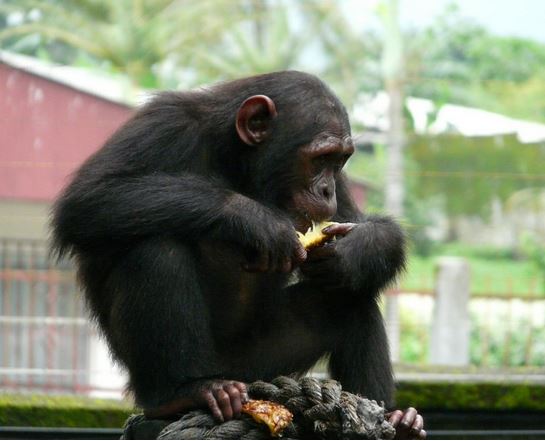The future survival of the Nigerian-Cameroon Chimpanzee (Pan troglodytes ellioti) is being seriously threatened by climate change, a new study published in BMC Evolutionary Biology warns.
By the year 2080, the chimp subspecies’ dramatic loss of habitat may be so extensive that it may struggle to survive, the authors wrote. They say their findings suggest that climate change may be harming chimpanzee population to a greater extent that previously realized.
Pan troglodytes ellioti is the rarest of all chimpanzee subspecies. Today, there are only about 6,000 individuals left, experts have estimated. Previous studies had shown how their habitats were being threatened by agriculture, logging and illegal hunting. The researchers say their study is the first to comprehensively look at the possible effects of climate change.
Lead author, Paul Sesink Clee, Graduate Research Fellow at Drexel University, US, said:
“The Nigeria-Cameroon chimpanzee is perhaps the least studied of all chimpanzee subspecies. This is the first time that their distribution and habitat has been studied in such detail, and the data used to predict how their habitats might alter under climate change.”
“We were surprised to see that the Nigeria-Cameroon chimpanzees living in the savanna-woodland habitat of central Cameroon are under the most immediate threat of climate change, and may completely lose their habitat within our lifetime.”
The scientists mapped the chimpanzees’ locations using reports of sightings, evidence of activity including tools and nests, and hair and fecal samples gathered for genetic analyses. It is one of the very few groups studying Nigeria-Cameroon chimpanzees.
They mapped the geographical distribution of two distinct populations of P. t. ellioti – one population in the mountainous rainforests of western Cameron, and the other in central Cameroon where three distinct habitats overlap to form a mosaic of forest-woodland-savanna.

“Ngambe”, a chimpanzee rescued from illegal animal trafficking who now lives at the Limbe Wildlife Center in Cameroon. (Credit: Paul Sesink Clee. Image: Eurekalert)
These fragile ecotones (ecosystems) are believed to be vital in driving variation and diversification of species across the planet.
The researchers combined the population data they had gathered with the environmental characteristics of their locations (including tree cover, vegetation, slope and climate) to determine how habitat influences the distribution of the Nigeria-Cameroon Chimpanzee.
They then created climate change scenarios for years 2020, 2050 and 2080 to predict how these habitats might change. The scenarios were provided by the United Nations’ Intergovernmental Panel on Climate Change and considered a varying range of factors including use of non-fossil and fossil fuels, environmental protection efforts, and human population growth.

Lead author Paul R. Sesink Clee (Image: Drexel University)
While the populations in the mountainous rainforest habitat were predicted not to be significantly affected, the ecotone habitat of the second population was forecast to decline rapidly under all scenarios by the end of this decade. In fact, they could disappear nearly entirely in the worst case scenario by 2080.
As approximately half of all existing Nigeria-Cameroon chimpanzees live in the ecotone habitat of central Cameroon, their findings suggest that this subspecies of chimpanzee is especially vulnerable to climate change.
The authors point out that their models do not factor in chimpanzees’ potential ability to adapt to changing habitats, or migrate to new areas with optimal conditions.

